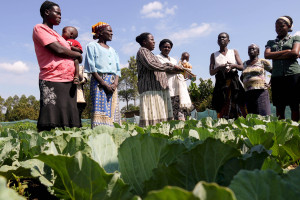The following considerations and recommendations are based partly on the April 2015 SOPs that the Sierra Leone Ministry of Health and Sanitation (MOHS) and UNICEF developed with partners of the Social Mobilization Pillar within the NERC in the country . Lessons learned up to this point in the epidemic were incorporated in the SOP.
Selection, Recruitment and Placement
The first step in achieving effective community engagement is to ensure that there is a cadre of effective social mobilizers on the ground. Social mobilizers provide information and support to communities, and engage community members in strategic dialogues. These dialogues are typically designed to help community members uncover and reflect on the individual and community barriers and facilitators to containing Ebola and to promoting behavior change. The most effective mobilizers are trusted people already living in the community, with outside mobilizers providing support. While all mobilizers should meet certain criteria for age, gender and language skills, prioritization in recruitment should go to Ebola survivors and Ebola-affected persons to promote prevention and build trust in the health system. Women also need to be actively recruited in order to ensure a gender balance and address potential gender-related sensitivities (for example, a woman social mobilizer might be more helpful in supporting a family when a female household member’s body needs to be prepared for a burial). In all cases, SM partners should consult and include local leaders—especially traditional, women’s, youth, and religious leaders—to get input on the selection and recruitment.
Mobilizers Enhancing General Community Engagement
Below are general guidelines for community engagement in the Ebola response.
- Consider community leaders as experts in their own culture, tradition and practices. Include them in planning, implementation and evaluation of programs and messaging. Engage well-respected leaders as key influencers.
- Consider community empowerment approaches and dialogues that help community members feel empowered to take action and/or develop action plans to prevent or end Ebola in their community. Engage communities to analyze and take ownership of their own situations.
- Do not preach, teach or blame. Remember that SM is all about building trust. Take care not to bring undue stigma or attention to individuals or families affected by Ebola.
- Include women, children, and vulnerable groups, people living with HIV, and those with special needs, in developing and disseminating appropriate messages and approaches.
- Identify activities and messages through community dialogues and household visits, anticipating questions and concerns before they are raised.
- Adopt participatory (two-way) communication for all communication channels including radio call-ins, community dialogues and household visits. While there may be situations where megaphones and loudspeakers may be appropriate, particularly when the epidemic is surging, it is better to listen to and address community members’ concerns accordingly.
- Recognize and promote people in the community who continue to practice behaviors that stop the spread of Ebola, and who help others do the same.
- Address stigma, discrimination and rumors—particularly those about survivors and affected families.
- Consider community surveillance initiatives such as a community task force to enforce the exclusion of strangers and assume a leadership role in prevention (such as keeping community members away from sick people or the dead). In Liberia, the community task force was also responsible for alerting community members to the presence of Ebola, monitoring the health of the sick and their family members, engaging in reporting, and managing resource provisions for community-based quarantines and isolation.
Mobilizers Enhancing/Supporting Service Delivery
Due to their roles as trusted sources of support and information on Ebola, mobilizers play an important intermediary role between the community and Ebola health services. For front-line service providers—ambulance teams, surveillance officers, contact tracers, swab teams and burial teams—mobilizers should actively play supporting roles. It is important, however, that mobilizers do not attempt to take on the work of these service providers, but rather help them operate smoothly while in communities. Ideally, mobilizers should be included in all alerts and work in coordinated, integrated teams with other front-line service providers. Depending on the type of alert, the distance to the home and other factors, the timing of arrival of front-line responders may vary. Steps mobilizers can take to support case management, quarantine and burial teams are included in Appendix C. How Mobilizers Can Support Ebola Emergency Teams.

